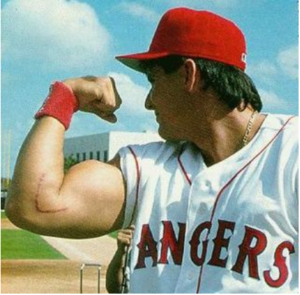Jose Canseco’s book Juiced: Wild Times, Rampant ‘Roids, Smash Hits and How Baseball Got Big has been greeted by almost everyone associated with this “all American” sport with a whole lot of sanctimonious blather:
- Fellow players profess incredulity at Canseco’s claims that he and many of baseball’s best players were (and are) juiced-up on steroids.
- Major league officials seem positively penitent trying to assure fans that they will do everything possible to rid the sport of performance enhancing drugs.
- Fans (a.k.a. baseball “purists”) are so outraged, they are calling into question all records set over the past decade as probably achieved by pumped-up cheaters. Never mind that these cheaters rescued the game from almost terminal disinterest amongst these same fans after the baseball strike of 1994.
- Team owners and fans alike knew well that the sudden supernatural performances of once mediocre players did not result from pumping iron during that strike.
But, so what if players take steroids. It is a victimless vice, far less poisonous than alcohol. And, where a “roid rager” merely intimidates, a drunk actually kills.

Given all the fuss, however, one might think that Canseco’s confessions amounted to heresy. But the heresy is not Canseco’s revelations (and accusations); rather, it is the collective hypocrisy of all who refuse to admit that cheating to get ahead in sports (and life) is as American as, well, baseball and apple pie.
Washington, Jefferson, and the founding fathers built America by cheating Indians and blacks of their civil and economic rights. Ford, Rockefeller, and the robber-baron industrialists made their fortunes by cheating labourers of fair wages whilst forcing them to work in horrible conditions. Rutherford B. Hayes, John F. Kennedy and George W. Bush are all reputed to have cheated their way to the Presidency by rigging votes in one state or another.
But I digress. This is about sports after all:
Players from the CCNY basketball team in the 1950s to those from Arizona State in the 1990s were discovered to have taken bribes to manipulate the outcome of their games. Rosie Ruiz joined the race only in the last mile to cheat her way to victory the 1980 Boston Marathon. In that same year, Tonya Harding had goons ambush Nancy Kerrigan hoping to cheat her way to Olympic gold – in the genteel sport of ice skating no less. Don King in boxing; Marion Jones in track and field; Football and steroids? Enough said.
Of course, cheating is nothing new to baseball:
Some of the more notorious scandals include the 1919 White Sox team taking bribes to throw the World Series; Albert Belle (1994) and Sammy Sosa (2003) using corked backs to hit more home runs; Pete Rose betting on the outcome of games in his capacity as player for and manager of the Cincinnati Reds; and, George Brett (1999) using pine tar on his bat to increase his batting average.
Nevertheless, some might maintain their (moral) outrage by suggesting that steroid use is a worse form of cheating because it is illegal. But so was alcohol during the most productive years of Babe Ruth’s career. And, I doubt anyone would argue that Ruth was a teetotaler or that his records should be called into question because he abused alcohol. Moreover, it is plausible that alcohol was an emotional and physical palliative that made Ruth a more productive player. A more salient historical consideration, however, is that Ruth would most likely have not had any records if blacks were not segregated from the major leagues during this period.
Ultimately, Canseco’s book increases the chance that many players will get caught taking steroids. And, therein lies his virtue (helping to clean up the sport) and only sin (exposing his fellow players). Regrettably, in sports (as in life) it is not the cheating that causes shame and outrage; rather, it’s admitting to it or, worse yet, getting caught. But baseball players who are caught may well claim that they were merely seeking their piece of the American pie – the old fashioned way.
News and Politics
Leave a Reply
You must be logged in to post a comment.